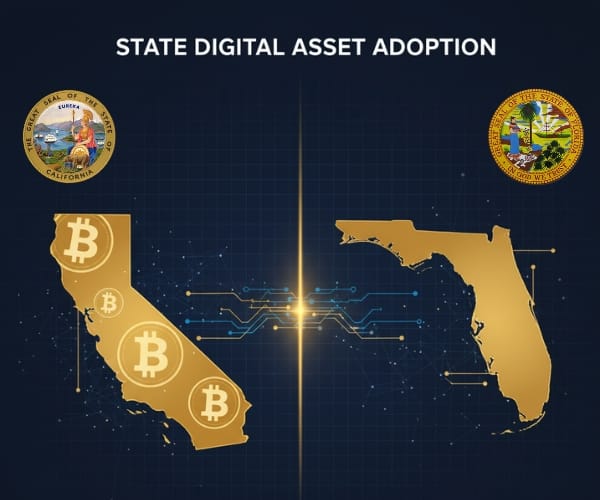California and Florida Pass Landmark Laws Allowing State Custody of Bitcoin and Crypto
California and Florida just passed laws allowing state custody of Bitcoin and crypto. With Florida investing up to 10% of state funds in digital assets, this marks cryptocurrency's biggest legitimization milestone yet.

Two of America's largest states have just taken a decisive step toward mainstream cryptocurrency adoption. California and Florida have both passed legislation that will allow their governments to hold Bitcoin and other digital assets, marking a pivotal shift in how state governments view and interact with cryptocurrency.
Historic Legislation Signals Growing State-Level Acceptance
In a near-simultaneous move that reflects cryptocurrency's growing legitimacy, both California and Florida enacted laws permitting state custody of digital assets. California's AB 1660, signed by Governor Gavin Newsom, authorizes state and local governments to accept and hold cryptocurrency, while Florida's HB 3 allows the state's Chief Financial Officer to invest up to 10% of certain state funds in digital assets including Bitcoin.
Florida's legislation is particularly ambitious, explicitly naming Bitcoin, Bitcoin ETFs, and other digital asset investment products as permissible holdings for the state treasury. California's approach is more cautious, focusing initially on the infrastructure to accept and custody digital assets without mandating investment allocations.
The timing is significant. These laws arrive as Bitcoin trades near all-time highs and institutional adoption accelerates. According to CoinDesk, at least 15 other states are now considering similar legislation, suggesting a nationwide trend toward state-level crypto integration.
Market and Regulatory Implications
This dual-state approval creates a powerful precedent. California, as the world's fifth-largest economy, and Florida, a major financial hub, together represent enormous economic influence. Their willingness to custody cryptocurrency legitimizes digital assets in ways that years of private sector advocacy could not achieve alone.
The regulatory implications extend beyond state borders. As Bloomberg Law reported, state-level adoption may accelerate federal clarity on cryptocurrency regulation. When states begin holding Bitcoin in their treasuries, federal regulators face increased pressure to establish clear, workable frameworks rather than enforcement-through-litigation approaches.
Market analysts expect these moves to influence corporate treasury decisions. "When state governments hold Bitcoin, it removes a significant objection that corporate boards have historically raised about reputational risk," noted Coinbase in their analysis of the legislation.
XRP and Ripple: Strategic Positioning for State Partnerships
For XRP and Ripple, these state custody laws represent a transformative opportunity, particularly given Ripple's focus on institutional and governmental partnerships.
Business Development Opportunities: Ripple's expertise in cross-border payments and its existing relationships with financial institutions position the company ideally to provide infrastructure services to states looking to implement crypto custody. Florida's law specifically mentions the need for secure custody solutions—an area where Ripple's enterprise-grade technology could prove valuable.
Legal Vindication: The willingness of major states to embrace cryptocurrency custody arrives as Ripple approaches final resolution in its SEC case. State-level legitimization of digital assets strengthens the argument that cryptocurrencies like XRP serve genuine utility beyond speculative investment. California and Florida's actions implicitly reject the SEC's historically broad interpretation of securities law as applied to digital assets.
XRP Price Implications: Historical data shows XRP responds positively to institutional adoption signals. State treasury involvement could trigger similar price appreciation, particularly if states consider XRP for its speed and low transaction costs. While Bitcoin dominates current state-level discussions, XRP's efficiency advantages for government payment systems could drive future consideration.
Partnership Potential: State governments require not just custody but functional payment rails. Ripple's RippleNet and On-Demand Liquidity services are purpose-built for exactly these use cases. As states move beyond mere custody toward active use of digital assets, Ripple's payment infrastructure becomes increasingly relevant.
The precedent of government crypto custody also strengthens Ripple's international positioning. As Reuters has reported, Ripple already partners with central banks exploring digital currencies. U.S. state adoption provides powerful validation for these global initiatives.
The Path Forward
California and Florida's legislation represents more than symbolic acceptance—it establishes operational frameworks for government cryptocurrency interaction. As these states implement custody solutions and potentially expand into active treasury management, they'll create templates that other jurisdictions will likely follow.
For the cryptocurrency industry, this is the mainstreaming moment advocates have anticipated. When state governments hold Bitcoin in their treasuries, cryptocurrency has undeniably transitioned from fringe experiment to established asset class. The question is no longer whether governments will engage with crypto, but how quickly the remaining states will follow California and Florida's lead.
Key Takeaways:
- California and Florida have passed laws permitting state custody of Bitcoin and cryptocurrency
- Florida explicitly allows up to 10% of certain state funds to be invested in digital assets
- At least 15 additional states are considering similar legislation
- State-level adoption accelerates pressure for clear federal regulation
- Ripple and XRP are strategically positioned to benefit from government payment infrastructure needs
DISCLAIMER: This newsletter is for informational purposes only and does not constitute investment advice, advertising, or a recommendation to buy, sell, or hold any securities. This content is not sponsored by or affiliated with any of the mentioned entities. Investments in cryptocurrencies or other financial assets carry significant risks, including the potential for total loss, extreme volatility, and regulatory uncertainty. Past performance is not indicative of future results. Always consult a qualified financial professional and conduct thorough research before making any investment decisions.



